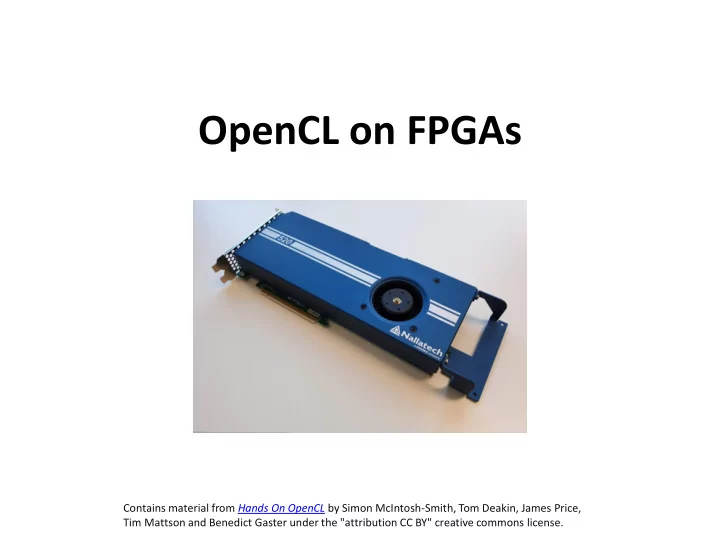

OpenCL on FPGAs Contains material from Hands On OpenCL by Simon McIntosh-Smith, Tom Deakin, James Price, Tim Mattson and Benedict Gaster under the "attribution CC BY" creative commons license.
What are FPGAs? • Reprogrammable hardware • Integrate huge numbers of lookup tables (LUTs), registers, on-chip memories, and arithmetic hardware (e.g. DSP blocks) • These on-chip resources are connected through a reconfigurable network • Traditionally programmed through a very low- level hardware description language – VHDL or Verilog 2
Why FPGAs? • Prototyping hardware designs – Application-Specific Integrated Circuit (ASIC): customized circuit for a specialized application e.g. aerospace microcontroller, Bitcoin miner – Application-Specific Standard Product (ASSP): customized for application market e.g. automotive microcontrollers, smart phone chips • Production systems – Reconfigurable = can modify electronics in situ – As cheap and power efficient as ASICs (except for very large volumes) 3
OpenCL on FPGAs • FPGA architectures are very different from GPUs and CPUs • Requires a completely different approach to achieve good performance • On CPUs/GPUs, you want lots of parallelism: i.e. lots of work-items and work-groups • For FPGAs, you want just a few work-items, each representing a long pipeline • Base-level for programming FPGAs is hardware definition language (HDL): Verilog or VHDL – Detailed; low-level; highly-specialized • OpenCL makes programming FPGAs more accessible 4
FPGA Architecture 5 Source: http://www.fpga-site.com/faq.html
FPGA Hard Blocks Most FPGA packages include blocks of predefined hardware (hard blocks) to implement commonly required functions • Digital signal processor (DSP) • Arithmetic units • I/O logic • Memory blocks 6 Source: Intel FPGA for OpenCL SDK Pro Edition: Best Practices Guide
Compiling OpenCL into Hardware size_t index = get_global_id(0); C[index] = (A[index] >> 5) + B[index]; F[index] = (D[index] – E[index]) << 3; G[index] = C[index] + F[index]; The Intel FPGA SDK for OpenCL Offline Compiler provides a custom pipeline structure that speeds up computation by allowing operations within a large number of work-items to occur concurrently. The offline compiler can create a custom pipeline that calculates the values for variables C, F and G every clock cycle, as shown below. After a ramp-up phase, the pipeline sustains a throughput of one work-item per cycle. 7 Source: Intel FPGA for OpenCL SDK Pro Edition: Best Practices Guide
OpenCL Design Components An OpenCL system design provides kernels with access to local and global memory (just like in a regular OpenCL program) 8 Source: Intel FPGA for OpenCL SDK Pro Edition: Best Practices Guide
FPGA Optimisation Tips • Create single work-item kernels if: – You cannot break down an algorithm into separate work-items easily because of data dependencies that arise when multiple work-items are in flight. – You organize your OpenCL application in multiple kernels, you use channels to transfer data among the kernels, and the data processing sequence is critical to your application. – Equivalent to an NDRange size of (1, 1, 1) 9
Single Work-Item Kernels • In this approach, the FPGA OpenCL compiler will attempt to pipeline the work-item • Special care needed to ensure the compiler can pipeline loops 10
More Tips for FPGA Optimisation • Optimize each kernel to target a single compute unit first • Then scale the number of compute units up until you've filled the FPGA – Compiling with fewer compute units takes much less FPGA compilation time • Consider moving data between kernels using OpenCL pipes or vendor extensions such as channels • Unrolling loops can help FPGA OCL compilers – e.g. #pragma unroll 8 • Optimise floating point operations • Avoid expensive operations • Allocate memory aligned to at least 64 bytes • Use restrict to avoid pointer aliasing • Avoid work-item ID-dependent backward branching 11
Using Pipes and Channels Source: Intel FPGA for OpenCL SDK Pro Edition: Best Practices Guide 12
Optimising Floating Point • Giving the FPGA OpenCL compiler more freedom regarding IEEE compliance can make a huge difference in performance • Key compiler flags include: – --fp-relaxed : compiler can change order of operations – --fpc : minimise type conversions and combine multiple rounding operations into one. Results in use of fused multiple-accumulate (FMAC) instructions • Fixed point even better than floating point on FPGAs, can pack in more execution units – OpenCL supports 8, 16, 32 and 64-bit fixed point 13
Operation costs on FPGAs • Expensive operations include: – Integer division and modulo (remainder) operators – Most floating-point operators except addition, multiplication, absolute value, and comparison – Atomic functions • In contrast, cheap operations include: – Binary logic operations such as AND, NAND, OR, NOR, XOR, and XNOR – Logical operations with one constant argument – Shift by constant – Integer multiplication and division by a constant that is a power of two 14 Source: Intel FPGA for OpenCL SDK Pro Edition: Best Practices Guide
Other FPGA Kernel Tips • Use well-formed loops – These have an exit condition that compares against an integer bound, and have a simple induction increment of one per iteration • Avoid pointer arithmetic, use simple array indexing instead • Avoid complex loop exit conditions • Convert nested loops into a single loop • Declare variables in the deepest scope possible 15
OpenCL on FPGA Summary • You'll probably need completely different kernels for optimal performance on an FPGA • Still uses the same overall OpenCL host infrastructure though • In theory, OpenCL supports using CPUs, GPUs, DSPs and FPGAs all at the same time … 16
Useful Resources Intel (formerly Altera): • https://www.intel.com/content/www/us/en/programma ble/support/support-resources.html • https://www.intel.com/content/dam/www/programmab le/us/en/pdfs/literature/hb/opencl-sdk/aocl-best- practices-guide.pdf Xilinx: • http://www.xilinx.com/products/design-tools/software- zone/sdaccel.html#documentation 17
Recommend
More recommend